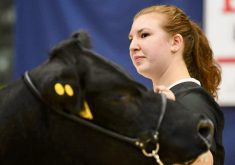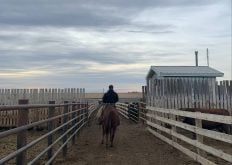Resiliency has been brought to the forefront in these last few months. It is the key to move forward in these changing times. The old strategies don’t work anymore,” says Beverly Beuermann-King, mental health and resiliency expert.
Beuermann-King has been referred to as the “resiliency builder.” She has been a long-time spokesperson for mental health. She is a Canadian certified speaking professional and has a wealth of experience speaking to and working with people for over 20 years. Her philosophy of Work Smart-Live Smart applies to all walks of life and growing up on a dairy farm provides her with insight into the experiences of women in agriculture.
Read Also

Treaty Land Sharing Network expands reach in Saskatchewan and Alberta
The Treaty Land Sharing Network, which connects land holders with First Nations and Metis people, has expanded since it began in 2018
Beuermann-King will be making two presentations at the upcoming Advancing Women in Ag Conference, slated for November 22 to 24 online. The first session focuses on depression and the second on having supportive conversations.
A helpful approach Beuermann-King suggests is the circle of control, influence and concern. “We can easily get too caught up in that which we have little control over,” she says. “It is important to bring it back to the level of what you can actually control. And move forward focusing our energies on the right thing.”
She groups ways of thinking into optimistic, pessimistic, negativistic and apathetic. “An optimist does not necessarily have their head in the clouds. They will get mad but won’t get stuck in the emotion. They can break it down and take action. The optimist can quickly move from problem identification to problem-solving, but the other three groups don’t do this.”
Beuermann-King also refers to the influence of the monkey brain when we are under stress. This could be a thousand thoughts racing through our brain keeping us awake at night, preventing us from focusing and being present. Consider how that monkey brain can keep us safe, but then also quiet down and focus. In an effort to be more mindful, ask what calms you down. What brings you joy and satisfaction? Focusing even for only for a few seconds is a good start, but continue working on it.
“For most of us, it is about micro-practices. Trying to do some of those practices when we have a spare few minutes, such as when you find yourself ahead of schedule or in between meetings or activities,” she says.
She acknowledges that those of us in agriculture have not been ones to openly talk about mental health issues or the importance of self-care in dealing with them. Growing up in a dairy family she understands the approach of working hard and “toughing” it out. But as she thinks back there were some helpful practices that were not likely considered self-care such as power naps, regularly gathering to eat together, eating healthy, homegrown food and sharing in conversations.
“We need to be purposeful in reaching out, connecting with each other and checking in,” she says.
Breaking the stigma on mental health is a step in the right direction. “If there is something positive coming out of COVID, it is more acceptance to mental health issues. In the workplace the pace of being able to have these conversations has likely accelerated by about five years,” she says.
It’s important to recognize when the situation is getting more serious. “If your mood is spiralling down and you are feeling that way more often than not, it is something to pay attention to. Everyone will have down days but if the negative mood persists for closer to a couple of weeks that is a sign, as well as if it starts to interfere with your life and you are not able to do things you did before.”
Beuermann-King stresses that depression is different for everyone and we can’t expect it to manifest in the same ways or for the same length of time. “Self-recognition is tough and it is important to learn and recognize the signs. In children, it may be sadness. For teens, it is anger and volatility and for adults, it can be all of those. Or it may show up as physical signs like a sore back or chronic stomach issues.”
When it comes to having supportive conversations, she advises “stepping up and not being afraid to open the can of worms. Don’t dodge the topic and let them know you are okay with talking about it.”
Understand that you may have to bring the person along in the conversation. Reassurance that they are not alone is helpful. Ten per cent of the population will be affected by mental health issues. Also, saying that you have been noticing some symptoms, that you are concerned and asking what you can do to help, can be part of the conversation.
Again, she stresses that depression and treatments are different for everyone, unique and variable. Some may have a single episode, while for others it may be an ongoing situation. Many factors influence mental health: history, brain chemistry, genetics, environment and the tool belt. She uses the example of the common farm stress of money.
“In that case getting help from a financial advisor can be the solution. In other cases, it may be medication or other treatments to help.”
Empathy and understanding are extremely important. Remember that just because one approach worked for someone does not mean it will for everyone. And the “just try harder” approach is not helpful.
Self-care is one of the three predictors of happiness, along with gratitude and generosity. Beuermann-King recommends developing practices in these areas. If a practice has been developed, it is easier to use rather than trying to be grateful only once when one is feeling despair.
She also talks about the importance of having an accurate perspective.
“One of my favourite quotes by Richard Bach is ‘What the caterpillar calls the end of the world, the master calls the butterfly.’ Remember that we have had the skills to get through things before and we can do it again. Ask what we can learn from others’ difficult situations. It is valuable to have a level of support, assistance from others and purpose, or some spirituality. But most importantly, know that you are not alone. There are many resources and places that people can reach out to for help these days.”
















